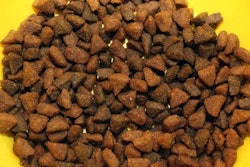
Beans can serve as a safe functional ingredient in weight-loss formulas for overweight dogs, according to research published in the Journal of Applied Animal Nutrition.
To conduct this experiment, veterinary scientists at Colorado State University evaluated three dog foods, two of which contained beans, with overweight dogs. All three kibbles were made with poultry meal, wheat, corn, brewer’s rice, pork meal, bone meal, flaxseed, fishmeal, brewer’s yeast, vitamins and minerals. The difference was that one kibble was made with 25 percent cooked navy bean powder, and a second was formulated the same except with black beans. The third contained no beans. All three were formulated to be nutritionally complete and contained similar levels of calories and nutrients.
Thirty adult overweight pet dogs received one of the three diets for four weeks. Fifteen dogs ate one of the experimental diets for 26 weeks. In both short- and long-term groups, the dogs lost weight over time. The dogs were from retriever, terrier, herding and working breeds and were both mixed and purebred.
To understand how the overweight dogs were digesting the different diets, the kibble and the dogs’ feces were analyzed. The results showed that the dogs were able to utilize the energy stored in the bean-based diets at similar levels to the conventional kibble. After the end of the studies, the researchers didn’t observe any negative physiological reactions in the dogs in all three diets and both durations.
Dog obesity problem
A pet is considered to be obese when the body weight is 30 percent greater than normal. The 2014 Pet Obesity Study by the Association for Pet Obesity Prevention (APOP) reported that an estimated 52.7 percent of dogs and 57.9 percent of cats in the US are overweight or obese, which equates to approximately 100 million pets. Furthermore, 95 percent of the owners of overweight dogs and 90 percent of the owners of overweight cats believed that their pets were actually at a normal weight.
Similar to their human counterparts, excessive body fat increases the risk of preventable health issues and shortens the life expectancy of dogs. Data from Nationwide, the US’ first and largest provider of pet health insurance, revealed that pet obesity rose for the fifth straight year in 2015. Some of the most common obesity-related conditions in dogs reported to Nationwide include arthritis, urinary tract disease, liver disease and diabetes.


















